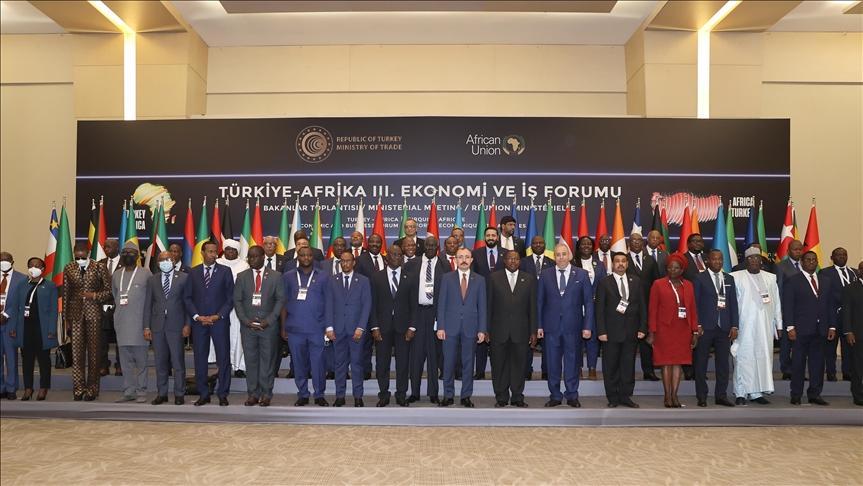Africa-Press – Ghana. The Türkiye-Africa Business and Economic Forum (TABEF), whose next edition will be held on October 16–17 in Istanbul, has become an essential platform for Turkish and African economic actors. Since its creation, the forum has played a key role in strengthening trade and economic relations between Türkiye and the African continent. As Ankara unveils new ambitions—notably to double its trade volume with Africa—some imbalances remain.
Since the early 2000s, Türkiye has intensified its presence in Africa, both diplomatically and economically. President Recep Tayyip Erdoğan has often emphasized the importance of this strategy: “Our trade with all of Africa was around 7 billion dollars in 2005. By 2016, this figure had already reached 17 billion dollars, and it continues to grow,”
This ambition has been accompanied by a surge in Turkish diplomatic missions across the continent. According to former Turkish ambassador Numan Hazar, “Since 1998, the number of Turkish embassies in Africa has increased from 12 to 44, illustrating Türkiye’s diplomatic commitment to the continent.”
Ankara Targets 50 Billion Dollars in Trade in the Coming Years
Bilateral trade figures confirm this growing engagement. In 2024, Turkish exports to Africa reached 19.4 billion dollars, up 1.7% from the previous year. Egypt accounted for 3.5 billion dollars, followed by Morocco (3.1 billion) and Libya (2.5 billion). While encouraging, these numbers remain below Ankara’s ambitious goal of achieving 50 billion dollars in trade in the coming years.
Turkish Minister of Trade Ömer Bolat recently stated:“Our exports to Africa have approached 10 billion dollars in just six months. Morocco has become our leading African partner, ahead of Egypt and Libya.”
Türkiye as an Emerging Investor
Beyond trade, Türkiye is asserting itself as an investor. Minister Bolat noted:“Our businesspeople have invested 2.3 billion dollars in Africa, creating more than 35,000 jobs.”
The construction sector remains central to this engagement:“Our construction companies have carried out projects worth 97.5 billion dollars in Africa. That represents nearly 20% of our international activities,” he explained.
These investments span multiple sectors—including energy, healthcare, and infrastructure—reflecting Ankara’s growing contribution to Africa’s development needs.
“Türkiye is a Reliable Partner in Africa”
For Ankara, the cornerstone of its approach lies in what it calls a balanced partnership model. Deputy Minister of Foreign Affairs Burak Akçapar recently stressed:
“Türkiye is a reliable partner in Africa. We do not impose; we seek common solutions in a win-win spirit.”
This stance resonates with several African leaders. During the previous Türkiye-Africa Forum in Istanbul, ministers from across the continent highlighted the need to diversify their economic partnerships and reduce over-dependence on Europe or China. The Turkish model, being more recent and flexible, is increasingly viewed as a valuable alternative.Still, challenges remain. The concentration of trade on a few countries—Egypt, Morocco, Libya, Algeria, and Nigeria—weakens Türkiye’s pan-African ambition. Likewise, the dominance of the construction sector exposes relations to African budgetary fluctuations.
Experts stress that Türkiye must diversify its areas of engagement—including agro-industry, renewable energy, and digital technologies—while investing in training and skills transfer. As one African diplomat summarized during the last forum:“Africans appreciate Türkiye’s responsiveness. But to build a lasting relationship, we must go beyond construction sites and invest in human capital.”
New Turkish AmbitionsThe Türkiye-Africa Business and Economic Forum 2025 is shaping up to be a turning point in Ankara’s economic diplomacy. As Türkiye multiplies its initiatives to strengthen its foothold on the continent, this new edition aims to redefine the priorities of the Türkiye-Africa partnership around three key pillars: sectoral diversification, enhanced direct investment, and technological cooperation.
The forum will also unveil Türkiye’s new Africa strategy, which is more inclusive and focused on innovation, digital transformation, renewable energy, and education. Ankara seeks to move beyond its image as a construction powerhouse to become a comprehensive development partner, capable of supporting Africa’s structural economic transformation.
According to Turkish officials, this shift marks a major evolution in bilateral relations: it is no longer just about trade, but about co-creating value chains and generating skilled employment. Several agreements are expected to be signed during the forum, particularly in technology, agro-industry, and green infrastructure, signaling a shared commitment to long-term cooperation.
For many observers, TABEF 2025 will be more than just an economic meeting—it will embody a new phase in the Türkiye-Africa strategic partnership, built on economic complementarity, human capital development, and a shared vision of sustainable growth.
africa-news-agency
For More News And Analysis About Ghana Follow Africa-Press







